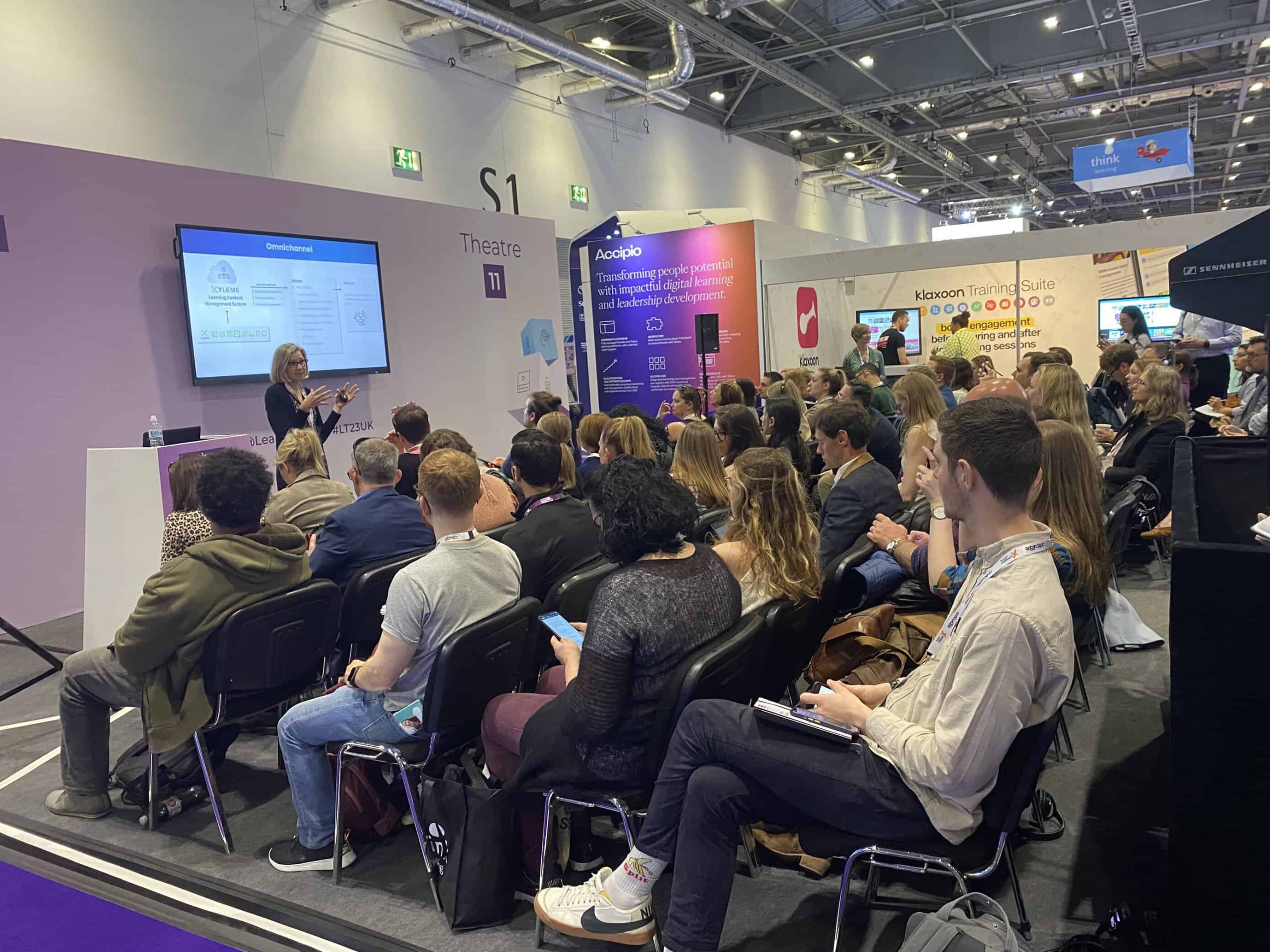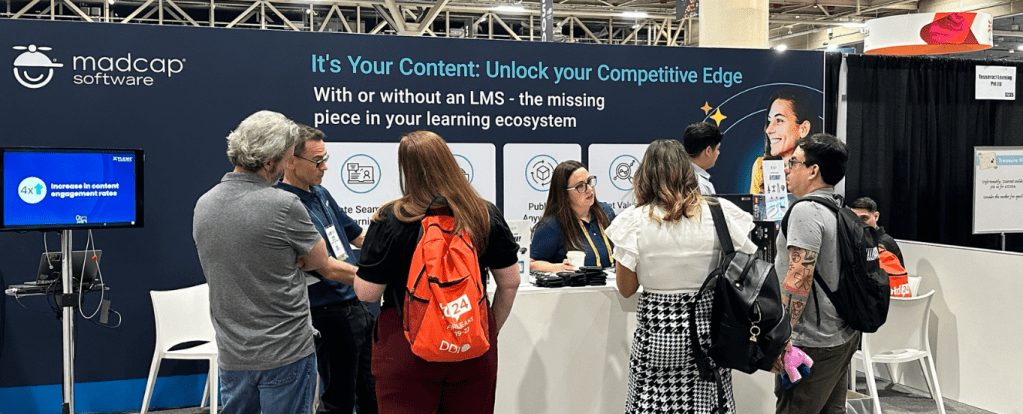
Brad Swingruber
Chief Revenue Officer
We did not need the World Health Organization (WHO) to declare that Covid is no longer a global health emergency — the large crowds and engagement at London Learning Technology last week proved it. There were clearly a lot of companies that were thirsting for innovation and co-worker engagement.
It seemed to be a strong mix of people searching for or exploring modern technologies. I found there are a few groups of people at the conference that you could categorize as followed:
- The “I have an agenda” crew: These individuals had a clear agenda and they wanted to make sure they met with the specific companies they set out to see. This ranged from the traditional LMS like Cornerstone, the Learning Experience Platform like Degreed, the Learning Content Management Solution like Xyleme, or point solutions like Articulate.
- The “help me” peeps: These are the folks that kind of know what they need, but need a bit more clarity. They want help understanding the missing piece to my learning ecosystem that can solve for an immediate challenge at their organization. They are hesitant to engage each booth because they don’t want to be sold to, but rather guided and consulted on the best path forward for their company.
- The “networking” buddies: They really want to use this opportunity to partner and network with like-minded companies or individuals. It’s clear they are searching for a mutually beneficial partnership and are eager to engage many companies. These are typically smaller groups or freelancers — while small, they can be quite mighty in their ability to add value!
=
- The “A new LMS will solve all my problems” people: This is not to speak negatively about an LMS. We understand that most LMSs (Learning Management Systems) are innovating to add more value than a traditional LMS, which typically just provides that green check mark of completion. A lot of companies still believe that if they replace their LMS then everything will be better. That is not the case! An LMS is typically not the problem, it’s usually someone’s content, their distribution of that content, and the way their learners consume that content — all of which an LMS has its limitations to support.

- The “adopters and innovators” of L&D champions: These are the people that are trying to absorb as much knowledge around things like generative AI and the impact of Large Language Models, incorporating chatbots, and modern ways to drive performance support. These champions love to hear different perspectives as well as market trends surrounding these exciting, but often intimidating, changes in the market landscape.
All these diverse groups of people had a lot to be excited about this year, but the big buzz at the show was clearly the two letters we seem to hear daily now. . . AI. Yes, Artificial Intelligence and its impact in the learning world. I sat in eight different presentations with six of them referencing AI in their talk tracks. I’ve tried to narrow down some of the things that stood out to me most.
Robots and Generative AI are not Taking Over the Learning World . . . Yet
Arnold Schwarzenegger is not going to appear from the future to tell you, “Come with me if you want to live.” However, Generative AI is not just a fad anymore — it’s here to stay. This was very apparent at London Learning Tech this year. Every company was highlighting “AI” capabilities, which I will admit, has been done for several years. So, what’s different this year?
There are two main differences I’ve noticed AI taking stage:
- People are getting much more educated about Artificial Intelligence
- Companies are now displaying AI in action with their learning solutions
In past years, AI was more of an idea that you might find in the science fiction section. While most of the AI capabilities are still quite minor and in their infancy stages, the AI train has clearly left the station. The fact that ChatGPT is getting infused into most people’s workdays or daily lives, proves that there is a widespread wave building.
AI and Where it Fits in Your World
If you’re not as familiar with Artificial Intelligence in the learning world, then allow me to explain where you might see it being used. AI is a big part of everyone’s life today, whether you realize it or not. AI is used when searching for results through the web, viewing Netflix recommendations which pushes content by persona, or viewing targeted ads which is designed to attract buyers at the perfect time. In the learning world it is still quite raw, but there are obvious signs that AI will dramatically increase speed to market and productivity. Many corporate HR and L&D professionals have started tip toeing into using AI in their daily jobs.
HR Departments:
- Recruiting – Generating job postings and parsing applications
- Email – Standardized outbound communication for candidates
- Onboarding – Standard policy outlines, responses, and communications
L&D and Technical docs:
- Training – Basic outlines for presentations, off the shelf content, and recommendations
- Learning Creation and Productivity – Transcription and basic content overviews
- Tech Writing – Code validation and code writing

All of these entry level uses of AI have fairly minimal risks, but the stakes will be higher with the more adoption we start to see. In fact, there were several technology companies at the Learning Tech show that are starting to incorporate AI into their core product, making it a focal point for future investment/expansion.
Here are some examples:
- Auto Tagging content to map to a skills autonomy (Xyleme focus area)
- Generating summaries or other ‘copilot’ content features (Microsoft)
- Translation through the use of voice over and speech to text (several translation technology vendors)
- Robust search indexing for smart recommendations (Xyleme focus area) Preliminary video generated content (Degreed focus area)
- Virtual coaching to offer recommendations and personalization (Saffron Interactive)
- Producing standard policies and procedure outlines in seconds (Easy Generator)
How You Can Use AI to Your Advantage
If you’re saying, “hey, I do that today” and you’re concerned you might be replaced by an AI engine, then don’t be. While there is great power in the future of generative AI, there is also great responsibility and oversight needed. More specifically, the employees with the skills and expertise for their industry (or proprietary company products and/or processes) will ultimately provide the oversight. This is because the AI engine can only offer information, not validation, compliance, or quality assurance, not to mention the challenges around legal and regulatory uncertainty like GDPR (General Data Protection Regulation), IP (Intellectual Property), discrimination, and more.
The bigger question companies should be asking is, how do I put myself in the best position to ride the inevitable tidal wave of AI and stay on it? The answer is a lot simpler than you think. What is one of the biggest differentiators your company has over its competition? It’s your proprietary content! Every company has their secret sauce that separates them in the market. This is not just the IP to the technology, widget, or soft drink they produce (but this is significant) — this is the proprietary content that resides in your internal body of knowledge and learning/training content.
ChatGPT or other open-source AI engines can’t reach in and pull information out from a proprietary database in your ecosystem, so it will be vital to have this under control and centralized when the time is right to utilize it at scale. The problem is that most companies have multiple versions and copies wandering around their ecosystem. This could be in SharePoint, an LMS, LXP, a knowledge portal, or even an app. If your content is consolidated in a way that allows you to know the single point of truth, down to the policy in your organization, then you will have a massive advantage over the competition!





